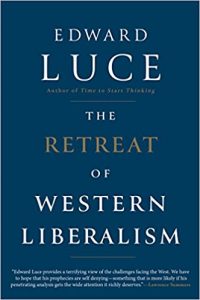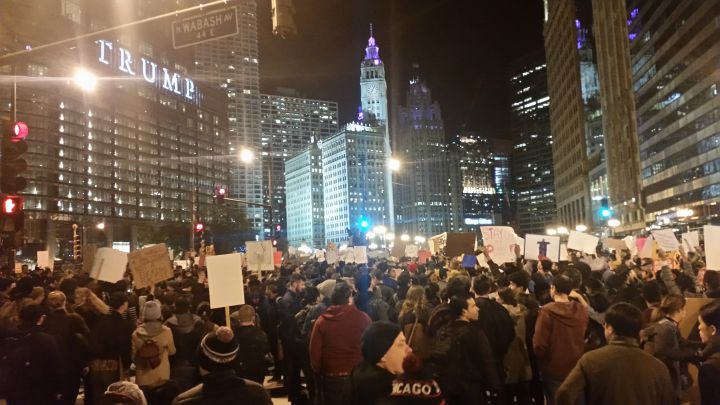Ahead of his visit to the Stigler Center on October 25, Edward Luce, Washington columnist for the Financial Times and author of The Retreat of Western Liberalism, talks to ProMarket about the reasons for the weakening of Western liberal democracies.

Three weeks after the radical right-wing Alternative for Germany (AfD) became Germany’s third-biggest party, Austrian voters are expected to hand the far-right Freedom party a similarly impressive achievement on Sunday, making it the de facto kingmaker of the country’s political system.
These electoral successes join other recent victories or near-victories for far-right nativist parties, strengthening the widespread sentiment that, as Edward Luce writes in his recent book The Retreat of Western Liberalism (Atlantic Monthly Press, 2017), Western liberal democracy “is facing its gravest challenge since the Second World War.”
Written following the double shock of Brexit and the election of Donald Trump, Luce’s book explores the reasons for the surge in nationalist populism, issuing a stark warning: “While liberal democracy is not yet dead,” he writes, “it is far closer to collapse than we may wish to believe.”
Luce, the Washington columnist for the Financial Times and former speechwriter for then Treasury secretary Lawrence Summers, is a certified member of the global elite. Yet his book serves up a scathing indictment of that elite, arguing that the complacency of the so-called Davos club toward rising inequality and the grim effects of globalization played a crucial role in facilitating the current crisis of democracy across the West.
Next week, Luce will give a talk at the Stigler Center about the weakening of Western democracies. The event will also be live streamed. Ahead of his Stigler talk, we interviewed him about the rise of anti-establishment politics and why Western voters have not necessarily lost their minds.
Below is a transcript of our interview, edited and condensed for clarity and length.

Q: You are careful not to call the current crisis of Western liberalism a “collapse,” but rather a “retreat.” What do you mean by “retreat”?
I believe “collapse” is too strong a word. Retreat implies that there’s a crisis, but also a possibility for regrouping. All is not lost.
The word liberalism, of course, is not meant in the specific American sense, but in the broader, neoclassical sense of Western political modernity.
Q: What is the nature of the challenge facing Western democracies?
There are multiple challenges. Globally, there’s a dilution of Western power. That global weight has been taken up, in many cases, by systems that are not liberal-democratic. That’s the macro picture.
The micro picture within Western democracies varies from democracy to democracy. Like Tolstoy’s unhappy families, each one is unique. But what is common across Western democracies is a rise in support for more authoritarian politics.
There is a gross and, I believe, closely related economic anxiety and atomization that is combining to challenge the normal way of doing business. For most of the postwar decades, establishment parties have been getting 80-90 percent of the votes between them. That’s now down, most recently in Germany, to 53 percent. This week in Austria we are going to see an equivalent decline. In the United States, if Donald Trump’s primary votes were added to Bernie Sanders’s primary votes and translated into Congressional seats, those two parties would account for more than half.
We’re seeing the retreat of establishment politics and established political parties in every country in the West.
Q: You devote a significant portion of your book to the “degeneration of Western politics.” What characterizes this degeneration, and how did it contribute to the crisis of Western democracy?
Look at voter turnout, membership in political parties, any measure of political participation. It doesn’t really matter which democracy you choose, it’s all downward—in some cases sharply, in others less so, but all of them steadily over 25-35 years. That is a seriously dangerous sign for the health of the body politic.
What is causing this decline in participation, this cynicism toward politics? The most obvious thing is the fact that the economy is not delivering the way it used to. Growth rates in incomes declined across the board, and in some cases vanished or even shrunk. The level of inequality is a huge factor as well. The economy is almost always on top of the list of voters’ concerns, and at the top of the explanatory list when you’re looking at voter dissatisfaction.
There are a hundred different manifestations of this. Declining participation is one, another is rising support for extremist and anti-established, anti-“business as usual” parties. In many cases, these are “magic bullet” parties with very simple solutions to complex problems, and in their own failure to deliver they are going to deepen the problem.
A really important additional factor here is the impact that technology, particularly social media, has had on public life. It makes campaigning easier and makes it easier to do myriad micro-targeting and psychographic profiling of potential voters, to send them completely contradictory messages, and to appeal to people’s emotions in ever more precise, sophisticated, and subliminal ways. It also makes governing more difficult.
 Q: Another factor, which you discuss at length in the book, is the anger directed toward political and economic elites, especially toward elite experts—what is often called pejoratively the “Davos class.”
Q: Another factor, which you discuss at length in the book, is the anger directed toward political and economic elites, especially toward elite experts—what is often called pejoratively the “Davos class.”
I am a great believer in the value of experts, research, study, empirical grounding of arguments. But if you look at the track record of elites and the groupthink of political leadership in the West—particularly in Britain and America—the elites can’t ask, with any sense of grievance, why people don’t trust them.
If you look at their record with the Iraq War, what they said was the pretext was false. The outcome, the democratization of the Middle East, was a fantasy at the expense of blue-collar lives. The 2008 financial meltdown followed the almost-consensus belief that the efficient market hypothesis was actually a true description of reality, from the same people who are benefiting from it to an almost historic tune.
These are the two most egregious examples of expert consensus and elite groupthink overlapping and being catastrophically wrong, with other people, non-elites, paying the price.
There are good grounds for people being very cynical about Western elites. But there is no single sentence or formula or paragraph that is going to encapsulate what is a perfect storm of reasons that is combining to undermine Western liberalism. It’s a variegated picture.
Q: Is it possible that, contrary to popular opinion, voters have not lost their minds?
You can say two things: 1) the electorate have not lost their minds; 2) they’ve chosen a cure worse than the disease, which is why I’m not hugely optimistic that we’re going to get out of this pretty soon, or that it’s not going to get worse—potentially a lot worse.
Q: What are the potential remedies Western democracies might pursue in order to combat this crisis?
The problem isn’t a lack of remedies. Some people tend to think we’ve got no clue how to deal with it—we do. The problem is that politics is not allowing us to pursue those remedies. The American system is a really good example: it’s impossible to imagine America having a debate over a Marshall Plan for the middle class. It would be dismissed as socialism or federal government takeover.
[Professional training] is one obvious remedy. The “future of work” is really the present tense of work. If we started now on a major overhaul of how we train people and how we view education and lifelong learning, we would be late by 15 to 20 years, but that would be a major improvement. These things are critical and would equip people with the ability to change jobs, be more flexible, and be more confident. It would help mobility.
That in itself is not enough. We do need redistribution. We need a fair system of progressive fiscal policy. It’s got to be fairer. If elites want to keep what they’ve got, they have to ask themselves what is the price of social peace, or—to put it slightly less dramatically—what is the price of sustaining our political system? The price is considerably higher than the one being paid right now.
But we are not going to be doing anything about this until we understand that people are not insane. They’re not all racist misogynists, and if we dismiss them as that, and if we don’t even have the courtesy to ask for their votes, if we say we don’t want your votes because you are deplorable, then we are setting up a self-fulfilling prophecy.
It’s an immensely dangerous attitude to take, tactically, but also wrong substantively. It misreads just how much continuity there was between Obama and Trump. Obama was the most outsider-ish person you could think of in 2008: he had a Muslim middle name, he was black, he had only just arrived in Washington, so he wasn’t yet Washington-ized. He was not, in any way, tainted by being establishment. The same applies to Trump in 2016, and millions of people who voted for Obama voted for Trump.
We misunderstand the continuity: this is not some recent eruption. There’s been pressure building over many, many years. Trump didn’t cause it, he is a grotesque symptom of the problem. We get blinded by the preposterousness of his personality. We forget it’s his very preposterousness that acted as an effective lightning rod. People don’t have any great expectations for Trump. What they said is, “This is how much contempt we have for the established class, that we’d even elect this guy.”
Q: A huge obstacle facing any potential remedy is the lack of trust and cynicism toward politics you described earlier. How can liberal democracies restore trust?
It’s very difficult to answer that. Elites need to demonstrate they understand what is going on. I don’t think trust is possible, unless there is a more enlightened standpoint from the elites.
It’s very interesting that the least mistrusted public institution in America is the military, and that we are now relying on military figures to constrain Donald Trump and dread the thought of the day General Mattis resigns and is replaced by Newt Gingrich or Rudy Giuliani. There’s an irony in that the least democratic institution is the one that we trust the most.
I don’t have a magic solution for [restoring] trust, except that waiting for it to return will guarantee it never does. People in public roles need to be demonstrating, through their words and actions, that they understand that people have well-grounded frustrations for the way society functions.
Q: Are you optimistic about the possibility that this will happen?
To some degree. I am optimistic that there is some truth to the belief that millennial generation is “woke,” that they are politicized in a way they weren’t a year ago. Voter turnout among young people in the U.K. general election in June is a good sign. In the U.S., it’s too early to tell if the Democratic Party decided where it’s going, but it’s clear that the participation and enthusiasm is with Bernie Sanders. There is no Macron-like figure in the American political scene at the moment.
Q: Macron himself is not enjoying great popularity these days. Isn’t that a danger in itself?
[Macron] is a very good example of how to use of technology to win, but also how difficult it is to govern. He won thanks to a beautifully executed campaign, but that raises expectations and makes the backlash all the more bitter. I dread to think what happens if he fails.
Disclaimer: The ProMarket blog is dedicated to discussing how competition tends to be subverted by special interests. The posts represent the opinions of their writers, not those of the University of Chicago, the Booth School of Business, or its faculty. For more information, please visit ProMarket Blog Policy.






